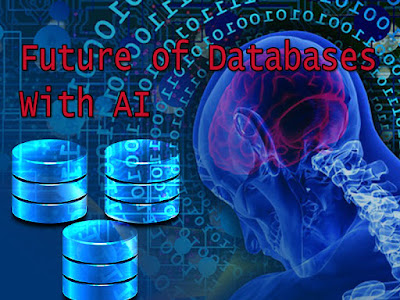What is the Impact of AI on Future Databases
Technology is moving fast, and artificial intelligence (AI) is one of the coolest things that’s happening right now. AI is not only making our lives easier, but it’s also changing the way we deal with data. AI is transforming the database management industry and shaping the future of databases. In this blog post, CSITechLK will look at how AI is affecting future databases and what it means for us as data experts.
Artificial intelligence is reworking every component of our lives from how we speak, save, work, research, play, and many more. AI is also revolutionizing how we save, control, analyze, and use data. Data is the fuel that powers AI programs and algorithms, and as data grows exponentially in extent, variety, velocity, and veracity, so does the need for brand new and improved database technology that can take care of the challenges and opportunities of the AI technology.
In this blog, we can explore what AI is, what destiny databases are, how AI influences future databases, what are a number of the benefits and drawbacks of AI-powered databases, and what are some of the fine practices for using AI in database management. We may also answer some regularly requested questions about AI and future databases.
Understanding AI and its role in Database Management
Artificial intelligence is a game changing technology. This technology has helped machines to learn and adapt to various situations. With its potential applications in the domain of database management, AI can remarkably aid in comprehending data, identifying patterns, and even predicting outcomes based on data analysis. The vast expanse of AI technology encompasses machine learning, which is a subset of AI that enables machines to learn from data in an autonomous manner without the need for explicit programming.
Narrow AI is the form of AI that we come upon most customarily in our everyday lives. It is designed to carry out specific tasks inside a confined domain or context, together with gambling chess, recognizing faces, recommending merchandise, and so forth. Narrow AI can be excellent at what it does however can not manage obligations out of its scope or adapt to new conditions.
General AI is the type of AI that we see in science fiction films and books. It is the hypothetical potential of machines or software to showcase human-like intelligence throughout any area or context, such as knowledge of emotions, growing artwork, solving problems creatively, and so forth. General AI does no longer exist but and may in no way be executed.
What are future databases?
Future databases refer to database technologies that are being developed to meet the needs and demands of the AI era.
With the use of AI techniques, these technologies improve the performance, functionality, scalability, security, usability, and other aspects of existing database models. They don't present brand-new database varieties.
There are several examples of future databases, such as graph databases, vector databases, and AI-first databases. Graph databases use graph structures to store and represent data and are ideal for managing complex and interconnected data that traditional relational databases may struggle with. Vector databases use embedding vectors to store and search unstructured data such as images, videos, and audio and enable semantic search that understands the meaning and context of data. AI-first databases leverage AI techniques as their core functionality and can perform tasks such as natural language querying, data integration, data cleaning, data augmentation, data synthesis, data compression, and data encryption.
Future databases are expected to play a significant role in aiding the development and use of AI applications and systems by providing efficient, scalable, and secure data management solutions.
The Future of AI in Database Administration
The future of AI in database administration seems exceptionally promising. With the ever-evolving and advancing technology, we can anticipate witnessing even more sophisticated and advanced applications of AI in the realm of database management. The integration of AI-powered databases has the potential to completely revolutionize our perception and interactions with data. We are only touching the surface of this technology's tremendous capabilities, and the future appears to contain endless opportunities for more discoveries and advances.
Advantages of AI-powered Databases
There are many advantages to using AI-powered databases. A significant benefit is the ability to automate certain tasks such as data cleaning and analysis. AI-powered databases can also identify patterns and make predictions that humans may not have been able to recognize.The usage of AI-powered databases has the potential to bring a variety of benefits, including faster data processing, higher accuracy, and more effective pattern and anomaly identification.These databases can help organizations make informed decisions based on valuable insights, ultimately leading to better business outcomes.
Advantages and Disadvantages of AI-Powered Databases
AI-powered databases offer several benefits, including:
High efficiency and accuracy for analysis and data management
Improved data security through better threat detection and prevention
Better decision-making through predictive analytics and machine learning algorithms
More personalized user experiences through targeted recommendations and content
However, there are also potential drawbacks to consider, such as:
Dependence on technology and the potential for system failures or errors
The need for specialized skills and expertise to implement and manage AI-powered databases
Concerns over data privacy and ethical considerations related to the use of AI in decision-making
Use Cases of AI in Different Types of Databases
AI technology can be adapted for different types of databases like relational, NoSQL and graph databases. In relational databases, AI can help in data modeling and query optimization. In NoSQL databases, AI can aid in data classification and anomaly detection. In graph databases, AI can assist in identifying complex relationships and patterns in data.
Relational databases, this use tables and columns to store data
NoSQL databases, possible to store unstructured and semi-structured data
Graph databases, which can represent complex relationships between data points
Time-series databases, which can handle large volumes of data generated over time
Fraud detection and prevention in financial databases
Predictive maintenance and quality control in manufacturing databases
Customer segmentation and targeting in marketing databases
Personalized healthcare recommendations in medical databases
AI-Driven Predictive Analytics for Databases
Predictive analytics is one of the best technology uses of AI in database management. Machine learning algorithms are used in predictive analytics to forecast future occurrences using historical data. Given that it enables us to comprehend our data better and make more educated decisions, this might be quite helpful in database administration.
What if you can look at your past data and predict trends of the future?
AI in databases can help you with it. It can evaluate your data and find patterns and trends that will enable you to anticipate the future more accurately.
How, thus, can you make AI useful for your database? You must create machine learning models that can draw conclusions from your data and generate accurate predictions. You can train your data models in such a way, including regression, clustering, and classification.
The future of databases is AI. There are certainly certain factors to take into account, but if you adhere to some best practices for applying AI in database management and AI-powered predictive analytics, you may earn profit from that.
Implementing AI in Database Management
The integration of AI into database management will transform the industry by enhancing efficiency, accuracy, and security. Nonetheless, this integration poses certain challenges that require careful attention. This section we are going to talk about optimal practices for integrating AI into database management and to look at what potential challenges of amalgamating AI with databases.
Best Practices for Implementing AI in Database Management
Implementing AI in database management requires careful planning and execution. It's important to have a clear understanding of your data and the problem you're trying to solve. It's also essential to have a good understanding of the AI tools and techniques you'll be using. Some best practices for implementing AI in database management include:
Identifying clear goals and objectives for the use of AI in the database
Ensuring that the right data is available for analysis and modeling
Developing and testing machine learning algorithms before deployment
Integrating AI with existing database management systems and processes
Providing adequate training and support for personnel responsible for managing AI-powered databases
Clearly define the targeted issue or problem to solve.
Choose the right AI tools and techniques for your data
Data set needs to be clean and organized.
Train your machine learning algorithms on a representative sample of your data
Continuously monitor and adjust your algorithms as needed
Challenges of Integrating AI with Databases
Coordination AI with databases presents a few challenges that have to be tended to. A few of the most challenging challenges are as follows.
Data security: AI models need access to sensitive data to make accurate predictions. It can be a risk of data breaches and cyber-attacks. To mitigate this risk, data should be encrypted and access should be restricted to authorized personnel.
Training data bias: Most AI models are only capable of the data set that they were trained on. If the training data is biased, the model will produce biased results.To overcome this challenge you need to have a diverse set of real data representation for the model.
Integration with legacy systems: Many organizations still use legacy database systems that are not compatible with AI. Integrating AI with these systems can be challenging and may require custom development.
Cost: Implementing AI in database management can be expensive, both in terms of hardware and software. Organizations need to weigh the potential benefits of AI against the costs of implementation.
Skillset: Implementing AI in database management requires specialized skills and expertise. Many organizations may not have the resources or expertise to implement AI effectively.
Performance Issues:AI algorithms can consume significant computing resources, which can cause performance issues in some database systems. Businesses need to carefully evaluate their database infrastructure to ensure that it can support the demands of AI algorithms.
Lack of Standards:There are currently no industry-wide standards for integrating AI with databases. This lack of standards can make it challenging for businesses to adopt AI in their database management
Despite these obstacles, the benefits of artificial intelligence in database administration make it a desirable investment for enterprises. Businesses may improve their data management procedures, increase data security, and acquire useful insights from their data by adopting AI-powered database optimization approaches.
Conclusion
The impact of AI on future databases is undeniable. AI has the potential to improve efficiency, accuracy, and security in database management. To implement AI effectively, organizations need to start small and scale up, choose the right tools, integrate AI with human intelligence, focus on data quality, and monitor AI performance. They also need to address challenges such as data security, training data bias, integration with legacy systems, cost, and skillset. With the right approach, AI can revolutionize the database management industry and unlock new insights and opportunities.
FAQs
What is the impact of AI on future databases?
AI has the potential to revolutionize the way businesses manage their data, from predictive analytics to data modeling and database optimization.
What are some of the benefits of AI in database management?
AI-powered database optimization techniques can help businesses improve their data management processes, enhance data security, and gain valuable insights from their data.
What are some of the challenges of integrating AI with databases?
Challenges of integrating AI with databases include a lack of skilled personnel, data security concerns, data integration issues, performance issues, and a lack of standards.
How can businesses overcome the challenges of integrating AI with databases?
To overcome the challenges of integrating AI with databases, businesses can hire skilled personnel, ensure data security, properly integrate data, evaluate database infrastructure, and work towards industry-wide standards.
Is investing in AI for database management worth it for businesses?
Investing in AI for database management can provide businesses with a significant competitive advantage in today's data-driven business environment.
How can AI be used in database management?
Ans: AI can be used for data integration, data modeling, predictive analytics, and security in database management
What are the best practices for implementing AI in database management?
Ans: The best practices for implementing AI in database management are to start small and scale up, choose the right tools, integrate AI with human intelligence, focus on data quality, and monitor AI performance.





No comments:
Post a Comment